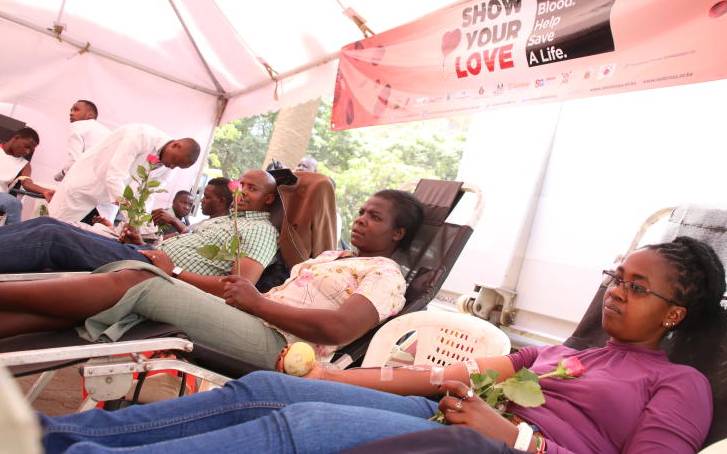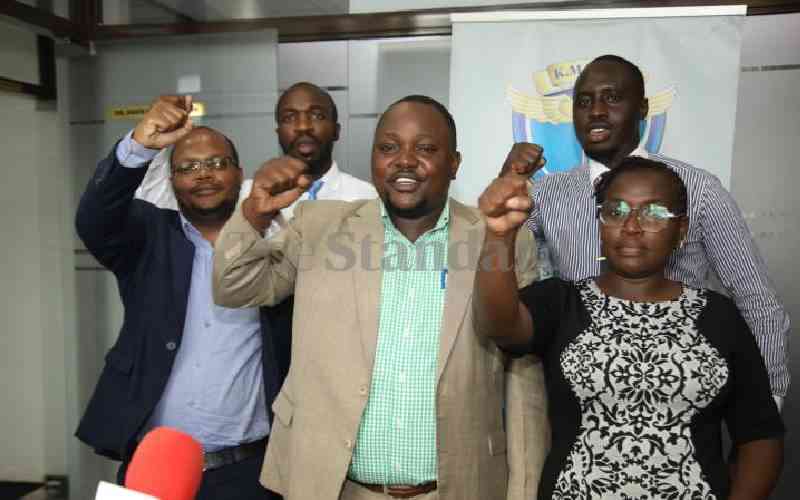
Blood donors hold their valentine flowers during the Show Your Love blood donation campaign that was being conducted by the Kenya National Blood Transfusion and the Redcross at the National Archives in Nairobi on February 14, 2019. [David Gichuru]
Hospitals in Nyanza are facing a crisis after the regional blood bank ran out of reserves.
The shortage has affected satellite banks in Nyamira, Kisii, Migori and Homa Bay, forcing those with sick relatives to either look for donors or buy blood from private hospitals.
The worst-hit is the Jaramogi Oginga Odinga Teaching and Referral Hospital (JOOTRH) where two patients are said to have died after doctors failed to find blood for transfusion.
The regional bank, just a stone’s throw away from the JOOTRH, ran out of blood four weeks ago and has remained empty after a donor funding blood banks across the country pulled out.
A senior official at the regional blood bank, who requested not to be named, said the crisis had affected the entire country.
“We have had a big challenge and we are not alone. Almost all regional blood banks have no blood,” said the official. He said that even if they had people willing to donate blood, the bank had no blood bags to store the blood in.
The Health Ministry, in charge of blood donation through the Kenya National Blood Transfusion Service (KNBTS), has for the past 15 years relied on the US President’s Emergency Plan for Aids Relief (Pepfar).
Pepfar, which has been supporting blood collection, testing and policy issues in Kenya, cut funding to Kenya in October this year, leaving the ministry in a precarious position.
With the current population of 47.6 million people, Kenya should collect about 460,000 units of blood per year, in line with the World Health Organisation’s recommendation that national blood banks should collect a unit of blood from at least one per cent of the population every year to be considered blood-sufficient.
Yesterday, JOOTRH CEO Dr Peter Okoth confirmed they were facing a blood crisis at the hospital but could neither confirm nor deny the reported deaths of two patients.
Donors
“It has been terrible. The crisis started after the donors to the blood banks pulled out. The banks have been facing so many challenges. The crisis has been compounded by the fact that schools, the biggest donors through students, have closed,” said Dr Okoth.
Asked how they were handling the crisis, Okoth said: “We are just surviving. We live one day at a time. We have been asking relatives to buy blood from other sources.”
On the reported deaths, Dr Okoth said: “Where there is no blood, there is the likelihood of people losing their lives.”
He said that some surgeries that need a lot of blood have been suspended until the situation normalises.
In Kisii, the shortage has hit the local hospitals, including the Kisii Teaching and Referral Hospital.
The blood bank site manager Sendora Henry said he could not comment on the matter because he was away on leave.
A junior officer at the station told The Standard the situation was the same in all national testing laboratories across the country.
The sites, sources said, have run out of automated screening reagents and are currently running on a manual platform, which has slowed down the screening process.
A letter signed on November 15, 2019, by the director Kenya National Blood Transfusion Services Fridah Govedi and sent to all blood transfusion facilities in the country said the officers in charge of the facilities should provide letters of request to KNBTS by the facility to be issued with blood for transfusion, copy of inspection report by KNBTS as well as copy of permit to operate.
Kisii Teaching and Referral Hospital (KTRH) CEO Dr Enock Ondari said they had been spending more than Sh500,000 a month to buy blood samples from the public for the last three months.
“It is costing us a lot because we have to send blood samples to Nairobi for testing. We hope the blood bank in Kisii will be restored soon,” said Dr Ondari.
The hospital receives referral cases from more than 40 health centres in the county as well as from neighbouring counties of Narok, Migori and Homa Bay.
Patients to pay
He said the hospital records an average of 18 deliveries daily. They also admit several accident victims who require an emergency blood transfusion.
He said with the shortage, patients will be forced to pay for blood transfusion.
The county director of health services Dr Geoffrey Otomu did not respond to our queries but a spot check by The Standard in most public health facilities indicated that most patients were buying blood from private facilities, which are also running out of stock.
The shortage of blood has also affected Homa Bay County Hospital, which is a referral facility for all health facilities in eight sub-counties in the area. The hospital’s CEO Lilian Kochola said they had shortage of three blood groups: A- (negative), B- (negative) and AB- (negative).
A spot check by The Standard established that private hospitals in Kisumu like Aga Khan and Avenue still had stocks of blood and were stepping in when requested by doctors to save lives of patients admitted in public hospitals.
Officials at the hospitals, however, declined to discuss the conditions under which they were giving blood to external patients.
In Kisii, Christmarrine Mission Hospital, a private facility, has been giving blood to critically ill patients at the KTRH for free for the last one month.
“I waited for two days to access my blood group. We were informed that there was no blood at KTRH and had to get it from outside the facility,” said a patient at KTRH who requested not to be named.
Last week, 20 students couldn’t donate blood at KTRH for lack of blood bags at the Kisii Blood Transfusion site.
 The Standard Group Plc is a multi-media organization with investments in media platforms spanning newspaper print
operations, television, radio broadcasting, digital and online services. The Standard Group is recognized as a
leading multi-media house in Kenya with a key influence in matters of national and international interest.
The Standard Group Plc is a multi-media organization with investments in media platforms spanning newspaper print
operations, television, radio broadcasting, digital and online services. The Standard Group is recognized as a
leading multi-media house in Kenya with a key influence in matters of national and international interest.











